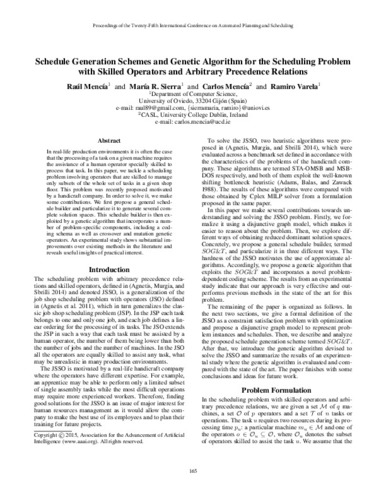Schedule generation schemes and genetic algorithm for the scheduling problem with skilled operators and arbitrary precedence relations
Autor(es) y otros:
Palabra(s) clave:
Schedule generation Schemes
Genetic algorithm
Scheduling problem
Skilled operators
Arbitrary precedence Relations
Fecha de publicación:
Editorial:
Association for the Advancement of Artificial Intelligence
Descripción física:
Resumen:
In real-life production environments it is often the case that the processing of a task on a given machine requires the assistance of a human operator specially skilled to process that task. In this paper, we tackle a scheduling problem involving operators that are skilled to manage only subsets of the whole set of tasks in a given shop floor. This problem was recently proposed motivated by a handicraft company. In order to solve it, we make some contributions. We first propose a general schedule builder and particularize it to generate several complete solution spaces. This schedule builder is then exploited by a genetic algorithm that incorporates a number of problem-specific components, including a coding schema as well as crossover and mutation genetic operators. An experimental study shows substantial improvements over existing methods in the literature and reveals useful insights of practical interest
In real-life production environments it is often the case that the processing of a task on a given machine requires the assistance of a human operator specially skilled to process that task. In this paper, we tackle a scheduling problem involving operators that are skilled to manage only subsets of the whole set of tasks in a given shop floor. This problem was recently proposed motivated by a handicraft company. In order to solve it, we make some contributions. We first propose a general schedule builder and particularize it to generate several complete solution spaces. This schedule builder is then exploited by a genetic algorithm that incorporates a number of problem-specific components, including a coding schema as well as crossover and mutation genetic operators. An experimental study shows substantial improvements over existing methods in the literature and reveals useful insights of practical interest
Patrocinado por:
This research has been supported by the Spanish Government under research projects TIN2010-20976-C02-02 and TIN2013-46511-C2-2-P, and by the Principality of Asturias under project FICYT2013 - COF13-035. Carlos Mencía is supported by SFI grant BEACON (09/IN.1/I2618)
Colecciones
- Informática [875]
- Ponencias, Discursos y Conferencias [4233]
Ficheros en el ítem





